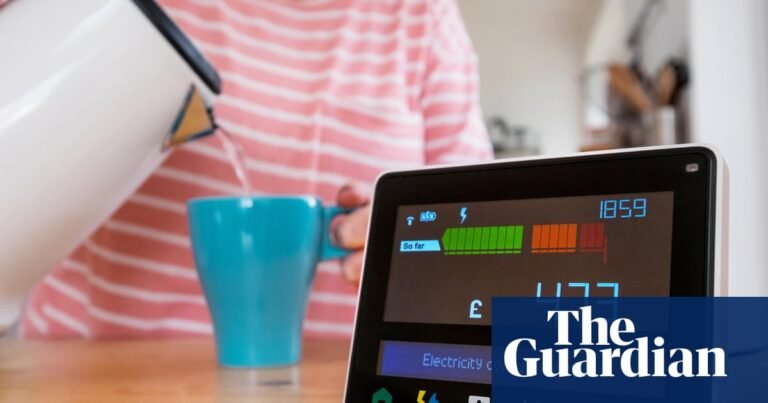As the temperature climbed towards 30C the peril of turning off a system that could leave people with their heating stuck on full must have looked like an avoidable disaster.
On Thursday ministers confirmed the “widespread switch-off” of the Radio Teleswitch Service (RTS), which controls an old type of electricity meter, “will not happen” on 30 June.
Instead the technology will be phased out more slowly. The first stage will involve a maximum of 600 households over a three-week period, and during this time the response times of suppliers to vulnerable consumers will be monitored closely.
But campaign groups say they are waiting for details of the new timetable, and want assurances that customers will not end up paying more when they are forced to switch meters.
Introduced in the 1980s, RTS was designed for people who also use electricity for their heating and hot water. It uses the long-wave radio frequency to switch meters between tariffs and can also turn heating and hot water systems on and off.
Suppliers had been given a deadline of 30 June to transfer customers away from the old technology, but problems in the transition – reported by the Guardian last month – led to fears that 300,000 homes could end up without a functioning meter.
Readers have continued to report problems obtaining an appointment or problems with replacements. Some were told a smart meter would not work in their home because of poor connectivity or even that there was currently no suitable tech that would integrate with their home setup.
“We’ve had three visits from Ovo engineers, all of whom advise a smart meter cannot be installed as the signal is too weak,” one married couple, who wished to remain anonymous, living near Chichester in West Sussex, said. “This has been going on for about 15 months.”
Energy UK, the energy industry trade body, said there were now technical solutions for every home. If a customer has previously been told a replacement is not possible, they should recontact their supplier, it added.
These solutions include a pre-programmed smart meter. After being contacted by the Guardian this is the solution being offered to the couple. It can be remotely switched to smart when signal strength improves.
Ovo said: “We have solutions in place for exceptional cases like this and remain committed to supporting them in scheduling an appointment to replace the meter.”
Other consumers are worried about what the switch off could mean for their energy bill. The old-fashioned RTS systems often include panel heaters or immersion heaters in water tanks that charge overnight when electricity is cheaper.
“My advice to anyone with storage heaters contemplating a change to a smart meter would be: don’t,” said Bryan Jones, who lives in Redruth in Cornwall.
Having his meter replaced by EDF 18 months ago (the network was originally due to be switched off in March 2024) was, he said, “one of the worst financial decisions I have ever taken”.
“Initially my smart meter was set up incorrectly to charge all units at day rates,” he said. “This was subsequently corrected but the adjusted smart meter then malfunctioned in different ways.”
“A recent review of my electricity usage between January and April 2025 has revealed that a third of my night units have been charged as day units, due to the smart meter overriding my heater settings.”
Two appointments to replace the meter were missed by the supplier.
skip past newsletter promotion
Sign up to Business Today
Get set for the working day – we’ll point you to all the business news and analysis you need every morning
Privacy Notice: Newsletters may contain info about charities, online ads, and content funded by outside parties. For more information see our Privacy Policy. We use Google reCaptcha to protect our website and the Google Privacy Policy and Terms of Service apply.
after newsletter promotion
Jones is now on a priority list to have his meter changed. After the Guardian contacted EDF it apologised for the missed appointments and applied compensation. It is now investigating the billing errors.
Ofgem, the energy regulator for Great Britain, said “no customer should be financially disadvantaged” as a result of the swap. Suppliers should be “offering the same or equivalent tariffs after their RTS meter has been upgraded”, it added.
The meters are replaced at a rate of 1,800 a day but Ofgem wants the work to “go faster” still.
The government said the energy minister, Ofgem and Energy UK would meet fortnightly to review the progress of the phase-out, with particular attention paid to Scotland, where about a third of the remaining meters are located.
Charlotte Friel, the Ofgem director for retail pricing and systems, said the cautious approach being adopted “should reassure customers” but it “remains crucial that these meters are replaced urgently”. “It’s vital to engage with your supplier when offered an appointment,” she added.
Simon Francis, the coordinator of the End Fuel Poverty Coalition, said the RTS switch-off process was doomed to failure after it became clear that the deadline was simply unachievable.
“We now need to see a plan published that sets out how the gradual switch-off will take place, including which regions will be affected and when,” he said.
“Crucially, we also need firm and binding reassurances that no customers will be left without heating or hot water, and that no household will face higher bills as a result of the changes.”
